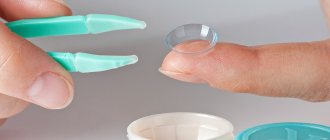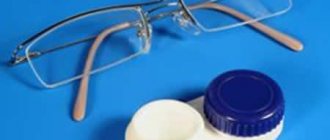Many users are interested in whether it is possible to swim with contact lenses. Doctors do not recommend using these optical products during direct contact with water. Manufacturers indicate warnings in this regard in the operating instructions for the optics. Let's consider whether it is dangerous to swim in lenses.
Contact lenses are very popular among people with refractive errors. Such optical products allow you to restore clarity of vision and fully enjoy the perception of the image. Unlike glasses, they do not restrict freedom of movement, so some patients prefer to wear them all the time. In this regard, many people have a question: is it possible to swim in the sea and fresh water bodies, swim in the pool, and also use the sauna and shower while wearing lenses.
Is it possible to swim in the sea and freshwater bodies with contact lenses?
Experts do not recommend using contact correction products while swimming in the sea and fresh water bodies. The lenses fit tightly to the cornea, but there is still a narrow space between them. When water gets in, it creates a favorable environment for the active proliferation of microorganisms, which leads to inflammatory processes and even the appearance of eye infections. Experts say that fresh natural bodies of water, especially lakes and rivers, pose a particular danger. According to statistics, such water contains a large number of harmful bacteria, such as acanthamoeba. It is a single-celled organism that typically lives in moist soil and polluted aquatic environments. If it gets on the mucous membrane of the organs of vision, it can easily provoke inflammation of the cornea (keratitis). Many microorganisms also live in salt water, so it is not recommended to swim in the sea with lenses.
Possible risks:
- Creating a favorable environment for the proliferation of microorganisms between the lens and the cornea.
- The development of inflammatory processes and the appearance of eye infections.
Which lenses are suitable for swimming in the sea?
Despite the vehement prohibitions of doctors, most patients still intend to swim in the sea wearing lenses. It is for such readers that I have prepared some useful tips that will help save their eyesight, nerves and money:
- The first thing you need to do before your trip is to purchase a spare pair of lenses. This way you will be reliably protected from sudden flushing or damage to the product.
- Don’t be lazy to buy eye drops with anti-inflammatory and antibacterial effects. In case of illness, you can always provide first aid to yourself and not wait to go to the doctor. This approach to your health will help complications pass you by.
- Also, do not forget to take your vision-correcting glasses with you. You may not need them, but it’s better to plan everything in advance.
- One way to preserve vision and lenses is to swim in specialized glasses or masks.
- A diving mask with diopters will allow you to swim in the sea without lenses. This is convenient and, perhaps, the safest of all options.
- Another way to preserve your usual lenses is to replace them with disposable ones. As mentioned earlier, after unprotected swimming in sea water, the lenses will have to be thrown away. It’s better to do this with disposable ones than to throw away permanent ones.
- An expensive but no less effective option may be to switch to orthokeratology lenses. These lenses do not need to be worn during the daytime. They are put on before going to bed, they temporarily correct your vision overnight, and the next day you can feel like a healthy person, not burdened with lenses and glasses.
Of course, the decision to swim with lenses or not is yours. I can only warn and recommend actions that will help reduce unwanted consequences when swimming in the sea with lenses. Don't forget, your health is in your hands. If you decide to ignore the doctors' requirements, do everything possible to ensure that your bathing is not only fun, but also not harmful.
Is it possible to swim with lenses in the bath and shower?
Ophthalmologists recommend removing contact correction products while taking a bath or performing water treatments in the shower. Firstly, strong water pressure can wash away optical products, and you will not be able to keep your eyes closed all the time. Secondly, if you swim in the lenses, they may partially change their parameters due to the absorption of various chemicals - the risk of shampoo, gel and foam getting on the surface of the optics cannot be ruled out.
Tap water itself cannot harm the eyes. However, when moisture stagnates in the space between the lens and the cornea, there is a risk of bacteria developing. To avoid eye infection, ophthalmologists recommend that patients remove optical products before starting water procedures.
Possible risks:
- The water pressure can wash away your lenses.
- Optical products can absorb various chemicals and change parameters.
- There is a risk of bacterial growth under the lens and the development of inflammatory processes.
Can I wear contact lenses when swimming in a pool?
Ophthalmologists advise replacing contact correction devices with special glasses while swimming in the pool. It's no secret that such water is subjected to purification, which is carried out in various ways: bromination, ionization, active oxygen, ozonation, etc. The most common is the chemical method, including using bleach and other components. Some of them can have a negative effect not only on the properties of lenses, but also directly on the visual organs. For example, contact with bleach on the mucous membrane of the eye often causes a burning sensation and characteristic redness.
In addition, it is not recommended to swim in the pool wearing lenses, since even the most modern cleaning methods do not guarantee the complete absence of microorganisms in the water. When they get under the lenses, they actively multiply, which can cause various eye diseases. For example, Pseudomonas aeruginosa is the causative agent of keratitis or endophthalmitis. Using special swimming goggles, you can eliminate such risks.
Possible consequences:
- Chemicals used to purify pool water can be harmful to lenses and eyes.
- There is a risk of eye infections due to the penetration of bacteria under optical products.
- There is a risk of losing contact lenses while swimming in the pool.
Can lenses be used in a water park?
When going to a water park, you should remember that, in addition to you, many other people visit it. Therefore, the water in it is regularly subjected to special purification from microbes. As with a swimming pool, there are a variety of methods and ingredients used, including strong disinfectants such as bleach. It is not recommended to wear lenses in a water park, since contact with these reagents may cause them to change their parameters, which will require premature replacement. In addition, aggressive components irritate the mucous membrane of the eye, causing burning and dryness, so experts advise the use of special safety glasses.
You should also remember that if you spend active time in a water park (riding slides, diving, etc.), contact lenses can easily be lost. In addition, there is a risk of bacteria getting under contact correction products, as is the case with a swimming pool, ponds, bathtub and shower.
Possible risks:
- Changes in lens parameters due to contact with chemicals.
- Loss of optical products during active water rides.
- Bacteria getting under contact correction products and causing eye infections.
Is it possible to go to the sauna wearing lenses?
Ophthalmologists do not recommend visiting saunas and steam baths wearing contact lenses due to the excessively high air temperature in these rooms. This may cause unwanted heating or drying out of optical products. In addition, hot air is an excellent breeding ground for various microbes and bacteria on the surface of the eyes, which increases the risk of inflammation and infections.
Under the influence of high air humidity, which is typical for these rooms, the lenses may simply fall out, as a result of which you will have to unplannedly purchase a new pair. Before visiting a bath or sauna, experts strongly recommend removing optical products and using moisturizing eye drops to replenish moisture deficiency.
Possible consequences:
- Undesirable heating or drying out of optical products.
- Increased risk of inflammation and infections in the eyes due to the active proliferation of microbes in hot air.
- Risk of loss of optical products due to high humidity.
Contact lenses and home baths, saunas
— Regarding the use of lenses in a bath or sauna, the opinions of experts vary. Some people categorically do not recommend wearing lenses in a steam room, since high temperatures can lead to drying out and deformation of the lens itself. And this can lead to corneal injury. Others are not against using it. But it is not recommended to wear lenses in a bathhouse for a long time, so as not to cause significant damage to them. Also, in the bath, you should not touch the surface of the lens. This will entail the rapid proliferation of harmful microorganisms.
— It’s also preferable to go to the bathroom without lenses. After all, getting personal hygiene products into your eyes can lead to severe irritation, as well as contact lenses becoming unusable. - But if it is not possible to remove the lenses, it is better to take a shower or wash with your eyes closed. This will help prevent water from getting into your eyes.
Also, you should not touch the lenses after your hands have come into contact with the shower door or curtain. They harbor many microbes that can lead to infections.
If it so happens that tap water gets on the lens, then it is better to remove them and carry out all disinfecting procedures, but it is better to throw them in the trash.
What contact lenses can you swim in?
If you cannot refuse to use contact correction products when in contact with water, we recommend using daily lenses. After bathing, you can simply throw them away and not have to wonder how to properly clean the surfaces of the optics from various microorganisms and contaminants. This will minimize the risk of infection in the eyes, especially if you use drops with disinfecting and moisturizing properties immediately after swimming. For people with myopia or farsightedness, 1-Day Acuvue TruEye and Dailies AquaComfort Plus are suitable.
Experts say that if necessary, you can swim in decorative lenses. Colored contact correction products are stronger and more durable. However, it is still better not to take risks and use special swimming goggles. This will protect your eyes and eliminate the risk of harm to optical products.
If you decide to swim in lenses, we recommend following simple rules:
- Use one-day models of contact correction products that can be thrown away immediately after swimming. This will eliminate the need for cleaning and reduce the risk of eye infections.
- When using scheduled replacement lenses, remove them immediately after swimming and perform a thorough cleaning (first mechanically on the palm, and then place them in a container with solution).
- After swimming in lenses, use eye drops with disinfecting and moisturizing properties.
It should be noted that at present scientists have not been able to confirm the presence of a clinically dangerous amount of bacteria on the surface of contact correction products after swimming. Research is ongoing, so it is not possible to reliably answer whether you can swim with lenses or not. But to eliminate possible risks, experts recommend using swimming goggles. Although there is an opinion that contact correction products, on the contrary, are necessary when swimming, as they can prevent chloride compounds from entering the mucous membrane of the eyes, which will reduce the likelihood of damage to epithelial cells.
You can order contact lenses and care products at a profit from the Ochkov.Net online store. We wish you happy shopping!
Can I swim with lenses in swimming goggles?
If you want to swim while wearing contact lenses, always wear swimming goggles. They can protect your eyes from bacteria, viruses and germs in the water. Safety glasses also prevent lenses from falling out. But make sure the glasses are high quality and waterproof. Goggles that slip off or fill with water won't do you much good.
If you are afraid of swimming with lenses, purchase prescription swimming goggles. Like regular goggles, swimming goggles have a precise prescription. Prescription goggles allow you to swim while eliminating much of the risk.
Some of these glasses even come with UV protection to prevent sun rays from entering your eyes. And you will have clear vision underwater.











